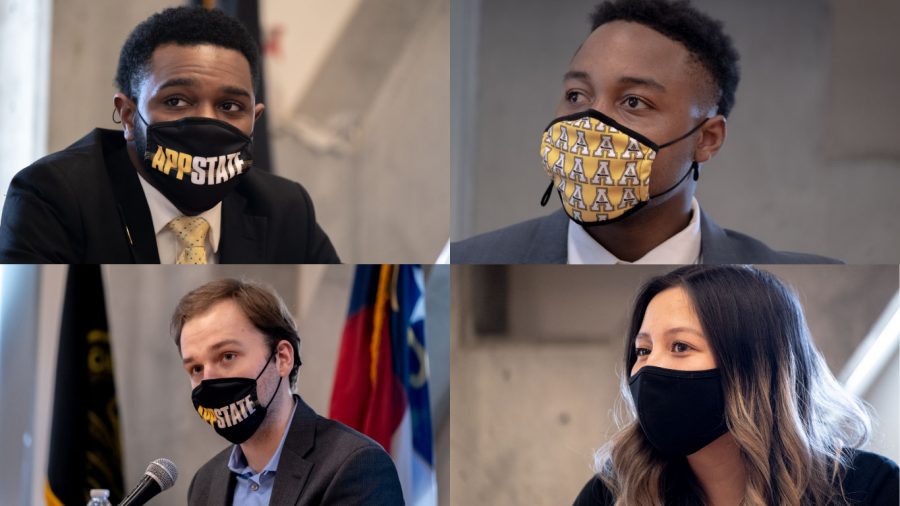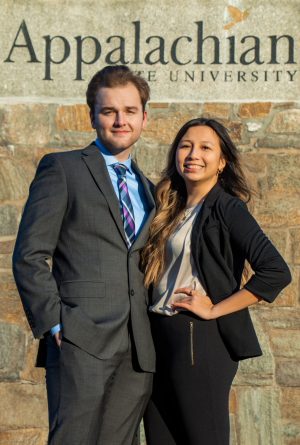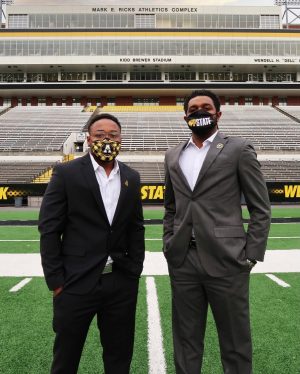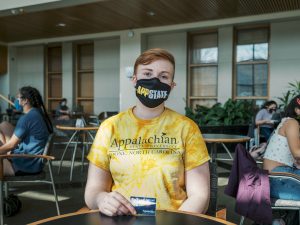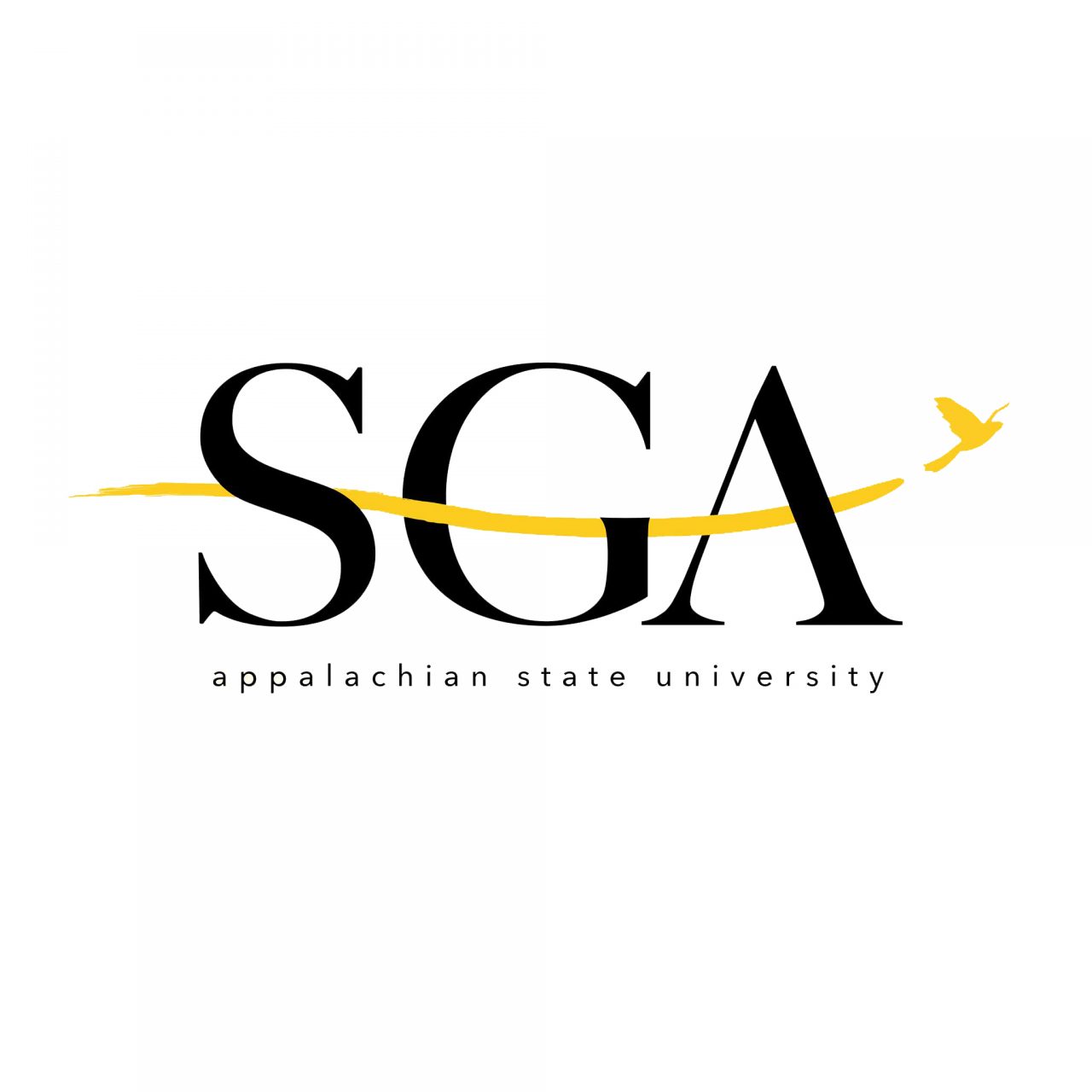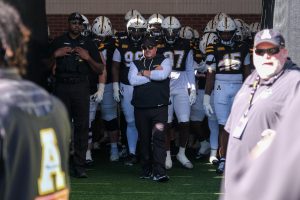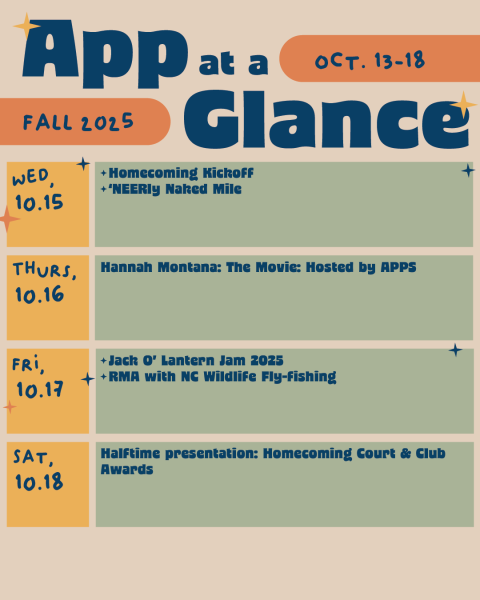Student body president, vice president candidates mask up to face off in debate
Bailey Gardin (top left) and DJ Evans (top right) are running for student body president and vice president, respectively, against Adam Zebzda (bottom left) and Jenn Banh (bottom right). The Gardin.Evans and Zebzda.Banh tickets will campaign through April 5 at 2 p.m.
March 29, 2021
Candidates for student body president and vice president debated Monday in a socially distanced Parkway Ballroom in Plemmons Student Union, responding to moderator-created and student-submitted questions.
Two groups of candidates are running to lead the student government: Bailey Gardin and DJ Evans, and Adam Zebzda and Jenn Banh.
The debate focused on candidates’ priorities, leadership capabilities, needs of students and concerns for the performance of the App State Student Government Association.
Moderator Susan McCracken, director of Career Development and Economic Engagement and App State SGA Director of Elections Ardeshir Piradeh brainstormed questions before the debate. Plus, students submitted questions via Zoom, where the debate was livestreamed.
Who’s running?
In their opening statement, each ticket had four minutes to introduce themselves and explain their reasons for running.
Presidential candidate Gardin, a junior political science major, is the current director of academic affairs for SGA, a founding member of the Black at App State Collective and serves on the Chancellor’s Student Advisory Board. Gardin said he is running to listen to and advocate for the student body, employing his campaign slogan, “amplifying all voices.”
“Marginalized voices, when they bring problems and concerns to administration, they should be heard,” Gardin said. “They should be welcomed, they should be discussed and they should be collaborated on.”
As director of academic affairs, Gardin has advocated for the pass/no credit system and mental health days for App State students.
He also said Black at App State has come far since its founding, now meeting monthly with Chancellor Sheri Everts and other administrators.
Evans, Gardin’s running mate, is a junior political science major from Bossier City, Louisiana. Evans serves as the Interfraternity Council senator for SGA and said he is running because of what he believes SGA can be.
“I’ve seen what SGA can do but I’ve also seen the flaws that SGA has,” Evans said. “If we enroll our methods into SGA, we can make it better than it already is.”
Evans said the four pillars of their campaign – equity, wellness, engagement and accountability – will help in “amplifying all voices.”
Evans is also a member of Sigma Nu, the international relations club and the hiking club.
Zebzda, a junior political science major, is also running for student body president. He is from Winston-Salem and focused his introduction on learning from the mistakes and problems he saw come to light in the 2020-21 academic year.
“This year we’ve seen the disastrous consequences of disconnected campus leadership that empowers broken and oppressive systems,” Zebzda said. “We need a better, unified and more equitable tomorrow. App State is plagued by systemic issues and I’m proud to have been fighting for systemic solutions.”
Zebzda.Banh’s slogan is “bridging the gaps.”
Zebzda is currently serving as the director of external affairs for SGA and has worked on several resolutions submitted to the Boone Town Council, including those related to student representation on town council and he has supported on-campus voting sites.
His running mate, Banh, is a junior psychology major and currently serves as a Multicultural Affairs senator for SGA representing Intercultural Student Affairs. She is also a first-generation college student. Banh’s introduction focused on finding her voice as an Asian American woman in middle and high school in a community that did not celebrate diversity.
“It wasn’t until high school when I learned that I had a voice,” Banh said. “And it wasn’t until I graduated high school when I realized that that voice is a strong and a powerful one. One that calls to be heard. So I’m here today to speak on behalf of the students who aren’t able to speak for themselves. I’m here today to ensure that every student is heard.”
Banh works at the university’s tri-centers: the Multicultural Center, Women’s Center and Henderson Springs LGBT Center. She also serves on the Town of Boone’s Cultural Resources Advisory Board.
The debate
After introductions, the candidates ran through a series of questions covering everything from moving forward from the pandemic to dealing with racism and hate on campus to internal debates about SGA’s friction and set rules.
The campaigns agreed on some things. For example, both tickets agreed that students feel overworked and overwhelmed after a full year of pandemic-centric life and school.
“What we’re seeing is that we’re having students experience significant mental fatigue, significant academic stress,” Gardin said.
The two pairs of running mates also agreed that SGA is experiencing a lot of divide between its cabinet and senate.
“It is no secret that SGA is very divided at the moment,” Banh said. “One of our initiatives is to plan to bridge those gaps within SGA, and once we bridge those gaps within our internal structures, we can go on to bridge those gaps within our community as well.”
McCracken also asked candidates about how they’re planning to further work on issues like diversity, equity and inclusion, which both groups agreed need to be addressed.
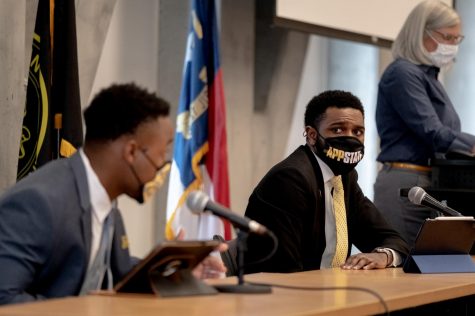
Gardin shared some of his experiences and accomplishments working in the Black at App State Collective, which has already seen an increase in programming for Black student athletes and SGA made the director of diversity and inclusion a permanent position in its cabinet.
Gardin emphasized his dedication and work with the collective, like early morning meetings with administrators, who he says he is not afraid to speak up to.
“To the voters, I would simply say if you’re worried about diversity, equity and inclusion, invest your vote in the proven ticket, the ticket that has done the work, the ticket that has had these conversations,” Gardin said.
Banh started her ticket’s response sharing that her work in the tri-centers has given her a wide worldview and shown her how important it is to create spaces for underrepresented students. She also talked about her position as a Multicultural Affairs senator. She says she’s loved advocating for multicultural students on campus, and that students have shared concerns about hate symbols in the free expression tunnels. She said hate speech and free speech are not the same thing.
Zebzda said that App State prides itself on creating responsible, global citizens, but its decisions often contradict this mission.
On other matters, the tickets verbally disagreed.
One question focused on the ways candidates planned to make themselves available to students if elected.
The Gardin.Evans campaign shared ideas for communication sessions, and even heading to local coffee shops once a week and inviting any student to converse with Evans or Gardin.
Banh rebutted. She said that just making yourself available is a “passive tactic” and advocated for a more “in your face” form of outreach.
McCracken also asked candidates how they will help App State move past COVID-19.
Zebzda said his campaign’s goal is to return to normal life safely.
“When it comes to next year, we have got to make sure that there is safety in place so that our students can learn in an environment conducive for education while also investing in things such as mental health resources, academic assistance and other items that students need to get back to normal,” Zebzda said.
Zebzda said he has worked with App State Police, Boone Police Department, the Town of Boone and campus organizations throughout the last academic year to implement measures that will protect public health.
Gardin, focusing on his campaign’s accountability pillar, said the administration needs to be more accessible so they can address the “significant mental fatigue” COVID-19 has caused. He said members of SGA have been forced to do this work over the last year.
“Why is it that Chapel Hill, NC State, UNCC get academic relief in the form of pass/no credit, mental health days, yet we don’t?” Gardin said. “Our administration should have the answer for that. That should not be on the work of student leaders to do that themselves.”
The SGA academic affairs committee is currently reviewing a bill to implement the pass/no credit system for the spring 2021 semester.
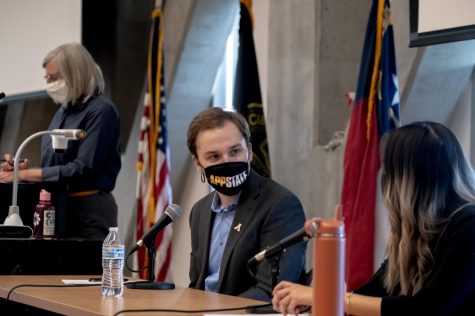
Another focus for the night was climate change. McCracken asked each pair their thoughts on App State’s plan for climate neutrality and other sustainability initiatives on campus.
Zebzda-Banh started the debate with Zebzda noting that the current plan was “a good start, but not enough.” Banh echoed Zebzda’s statements.
“We can’t continue with business as usual, by issuing reports that don’t produce results,” Zebzda said. “We need to take radical change, because business as usual is going to seal our fate and disaster.”
Currently, the university is planning to achieve climate neutrality “as soon as possible,” but doesn’t have a goal year in mind. Conversely, the Town of Boone is planning for climate neutrality by 2040. Zebzda helped draft the town’s resolution.
Evans said that he and Gardin support a goal of climate neutrality by 2025. He said that sustainability is not “just a trend,” but something to be taken seriously every day.
Gardin says he wants to enlist the help of organizations already working against climate change and “fighting this good fight.”
“We also want to have those conversations with groups and organizations who are more well versed in those in these matters,” he said.
Looking forward
After the debates, candidates reflected on the night and the remainder of their campaigns, which entered the active campaigning period Monday night one hour after the debate ended.
Gardin said both tickets represented themselves well, but maintained that his ticket is the proven one because of the “impactful, sustainable change” they have made already. He said he hoped students left the debate with a genuine understanding of him and Evans.
Both of the candidates emphasized they are eager to serve all students by challenging the status quo.
“We are dedicated to challenging everyone because that’s what’s supposed to happen,” Evans said. “At the end of the day, the faculty, the administration doesn’t have to like us. As long as the student body is happy, we’re gonna be happy.”
Zebzda said the election isn’t just about winning, it’s about “winning the future.”
“This election is really a turning point on campus to make sure that we can cause the change we need, we can reinvest in what we need, and we have to make sure everyone has representation now and long into the future,” he said.
Banh agreed, saying their ticket is open to listening, learning and advocating for students.
“I’m ready for students to finally have a choice and start being active and having a say,” Banh said. “We’re ready for students to start caring again, and this is the first and the biggest step.”
Voting for SGA student body president and vice president opens Wednesday at noon and will be open through April 5 at 2 p.m. SGA has not yet shared how voting will take place.

